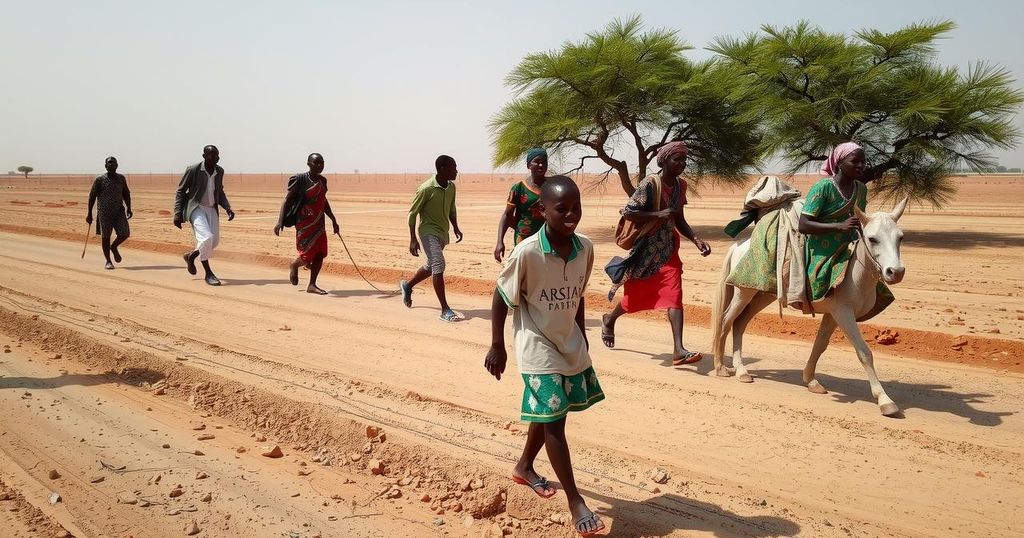This case study investigates the gendered impacts of climate change on pastoralist migration in northern Senegal. It focuses on the experiences of herders from the Ferlo Reserve migrating to Kédougou, examining their migration motivations, climate-related risks, and adaptation strategies. Utilizing qualitative data from 133 participants, the research emphasizes the differing impacts of migration on male and female herders. The findings advocate for gender-responsive adaptation strategies to better support affected communities amidst climate change.
This case study investigates the intricate dynamics of internal migration among pastoral herders in northern Senegal as they respond to climate change. Emphasizing the experiences of those migrating from villages within the Ferlo Reserve to the Kédougou region, the research examines the aspirations for migration, the climate-related risks faced, and the adaptive strategies employed by these herders. Notably, it adopts a gender perspective, highlighting the differing impacts of migration on male and female herders, and revealing how men’s longer migrations affect the women who remain in their communities. This research utilizes data from 133 participants through interviews and focus groups, alongside literature reviews, to derive insights into climate mobility and immobility in Senegal. Furthermore, the aim is to contribute to understanding gender-responsive adaptation strategies in the face of climate and environmental changes.
As climate change increasingly disrupts human activity in Senegal, it intertwines with the livelihoods of pastoralists. The complexities of migration in response to environmental challenges necessitate an exploration of how herders navigate these changes, particularly concerning gender roles. The study specifically examines the motivations that drive male herders to migrate, as well as the ramifications on women who are left behind. The findings suggest that while migration serves as a viable adaptation strategy for male herders, it simultaneously imposes additional burdens on the women who stay behind, underscoring the need for a nuanced understanding of these gendered dynamics in climate adaptation.
The focus of this study is essential for framing appropriate adaptation strategies that consider both the mobility of herders and the experience of women in their absence. Recognizing that the effects of climate change are often gendered allows for the development of solutions that are equitable and context-responsive. As pastoralist communities increasingly confront climate-linked obstacles, this research underscores the necessity of inclusive discussions aimed at crafting effective, evidence-based strategies for adaptation that consider the unique challenges faced by each gender.
This research sheds light on important dimensions of climate-induced mobility and immobility in Senegal, ultimately advocating for strategies that are informed by an understanding of the gender-specific impacts of climate and environmental changes on pastoralist communities. By prioritizing gender-responsive adaptations, stakeholders can better support both male and female herders in navigating the evolving climate landscape effectively.
Climate change poses significant challenges to pastoral communities globally, particularly in regions like Senegal where environmental conditions heavily influence traditional livelihoods. The interactions between climate variability and pastoralist mobility raise critical questions about how gender roles shape decision-making and adaptive strategies. This case study focuses on the ongoing internal migration patterns observed among herders from northern Senegal, specifically analyzing how these movements are affected by environmental stressors and the subsequent implications for gender dynamics within their communities. The exploration of these themes is crucial for formulating effective adaptation strategies that acknowledge the distinct experiences of men and women in the face of climate change.
In conclusion, the study highlights the intricate relationship between climate change, migration, and gender dynamics among pastoralist communities in northern Senegal. By examining how male herders’ migration choices impact the experiences of women who remain, the research provides valuable insights into the need for gender-responsive adaptation strategies. A deeper understanding of these dynamics is essential for driving equitable and evidence-based solutions that can effectively address the challenges posed by climate change in this context.
Original Source: reliefweb.int







